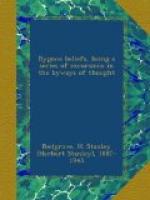HENRY MORE was born at Grantham in 1614. From his earliest days he was interested in theological problems, and his precociousness in this respect appears to have brought down on him the wrath of an uncle. His early education was conducted at Eton. In 1631 he entered Christ’s College, Cambridge, graduated B.A. in 1635, and received his M.A. in 1639. In the latter year he was elected a fellow of Christ’s and received Holy Orders. He lived a very retired life, refusing all preferment, though many valuable and honourable appointments were offered to him. Indeed, he rarely left Christ’s, except to visit his “heroine pupil,” Lady CONWAY, whose country seat, Ragley, was in Warwickshire. Lady CONWAY (ob. 1679) appears to be remembered only for the fact that, dying whilst her husband was away, her physician, F. M. VAN HELMONT (1618-1699) (son of the famous alchemist, J. B. VAN HELMONT, whom we have met already on these excursions), preserved her body in spirits of wine, so that he could have the pleasure of beholding it on his return. She seems to have been a woman of considerable learning, though not free from fantastic ideas. Her ultimate conversion to Quakerism was a severe blow to MORE, who, whilst admiring the holy lives of the Friends, regarded them as enthusiasts. MORE died in 1687.
MORE’S earliest works were in verse, and exhibit fine feeling. The following lines, quoted from a poem on “Charitie and Humilitie,” are full of charm, and well exhibit MORE’S character:—
“Farre have I clambred in my mind
But nought so great as love I find:
Deep-searching wit, mount-moving might,
Are nought compar’d to that great spright.
Life of Delight and soul of blisse!
Sure source of lasting happinesse!
Higher than Heaven! lower than hell!
What is thy tent? Where maist thou dwell?
My mansion highs humilitie,
Heaven’s vastest capabilitie
The further it doth downward tend
The higher up it doth ascend;
If it go down to utmost nought
It shall return with that it sought."[1]
[1] See The Life of the Learned and Pious Dr Henry More . . . by RICHARD WARD, A.M., to which are annexed Divers Philosophical Poems and Hymns. Edited by M. F. HOWARD (1911), pp. 250 and 251.
Later he took to prose, and it must be confessed that he wrote too much and frequently descended to polemics (for example, his controversy with the alchemist THOMAS VAUGHAN, in which both combatants freely used abuse).
Although in his main views MORE is thoroughly characteristic of the school to which he belonged, many of his less important opinions are more or less peculiar to himself.




